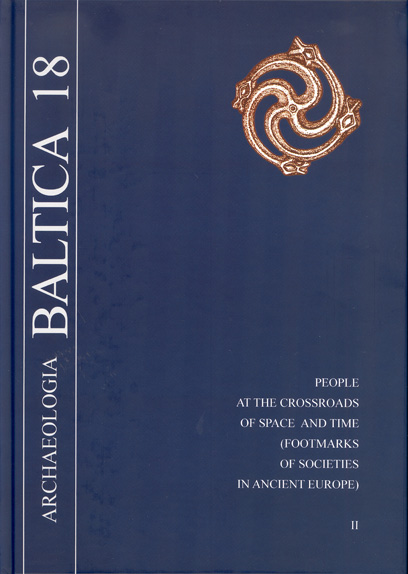Volume 18 (2012): People at the Crossroads of Space and Time (Footmarks of Societies in Ancient Europe) II, December 2012

Order by:
Pub. online: 30 Dec 2012
Type: In Memoriam
 Open Access
Open Access
Journal:
Archaeologia Baltica
Volume 18 (2012): People at the Crossroads of Space and Time (Footmarks of Societies in Ancient Europe) II, pp. 10–11
Pub. online: 30 Dec 2012
Type: Article
 Open Access
Open Access
Journal:
Archaeologia Baltica
Volume 18 (2012): People at the Crossroads of Space and Time (Footmarks of Societies in Ancient Europe) II, pp. 14–27
Abstract
Pub. online: 30 Dec 2012
Type: Article
 Open Access
Open Access
Journal:
Archaeologia Baltica
Volume 18 (2012): People at the Crossroads of Space and Time (Footmarks of Societies in Ancient Europe) II, pp. 28–42
Abstract
Pub. online: 30 Dec 2012
Type: Article
 Open Access
Open Access
Journal:
Archaeologia Baltica
Volume 18 (2012): People at the Crossroads of Space and Time (Footmarks of Societies in Ancient Europe) II, pp. 43–58
Abstract
Pub. online: 30 Dec 2012
Type: Article
 Open Access
Open Access
Journal:
Archaeologia Baltica
Volume 18 (2012): People at the Crossroads of Space and Time (Footmarks of Societies in Ancient Europe) II, pp. 59–82
Abstract
Pub. online: 30 Dec 2012
Type: Article
 Open Access
Open Access
Journal:
Archaeologia Baltica
Volume 18 (2012): People at the Crossroads of Space and Time (Footmarks of Societies in Ancient Europe) II, pp. 86–96
Abstract
Pub. online: 30 Dec 2012
Type: Article
 Open Access
Open Access
Journal:
Archaeologia Baltica
Volume 18 (2012): People at the Crossroads of Space and Time (Footmarks of Societies in Ancient Europe) II, pp. 97–108
Abstract
Pub. online: 30 Dec 2012
Type: Article
 Open Access
Open Access
Journal:
Archaeologia Baltica
Volume 18 (2012): People at the Crossroads of Space and Time (Footmarks of Societies in Ancient Europe) II, pp. 109–123
Abstract
Pub. online: 30 Dec 2012
Type: Article
 Open Access
Open Access
Journal:
Archaeologia Baltica
Volume 18 (2012): People at the Crossroads of Space and Time (Footmarks of Societies in Ancient Europe) II, pp. 126–146
Abstract
Pub. online: 30 Dec 2012
Type: Article
 Open Access
Open Access
Journal:
Archaeologia Baltica
Volume 18 (2012): People at the Crossroads of Space and Time (Footmarks of Societies in Ancient Europe) II, pp. 147–166
Abstract